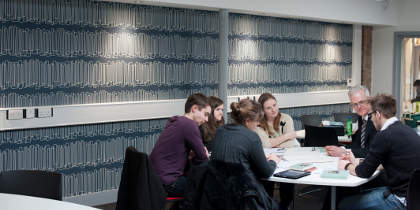
June 27, 2013, by Teaching at Nottingham
Doing Theology with Richard Wagner
Four of Professor Richard H Bell’s students speak about their experiences of taking his 20 credit module in the Autumn Semester 2012-13.
Sarah Ellerington (Theology and Religious Studies 3): “‘Doing Theology with Richard Wagner’ was a fantastic module – extremely interesting and really different from any of the Theology modules I’ve done before. People usually ask ‘What does Wagner have to do with Theology?’ when I tell them about the module, but it soon became clear that his opera Parsifal is heavily influenced by Christian tradition (the Eucharist, Christ and Good Friday) and philosophers such as Schopenhauer so he’s extremely relevant! I really liked having a lot of room for our own interpretation of Wagner’s theology in the module as well as hearing the theories of other scholars regarding his works. It is a particularly interesting module because Hitler’s love for Wagner’s music, which has coloured and shaped many people’s interpretation of Wagner, is often the centre of any discussion about Wagner. It was therefore fascinating to have the opportunity to explore Wagner’s work in the context of his own writing and beliefs.”

Tim Calderhead (Philosophy 3): “The module is aimed at both newcomers and seasoned lovers of Wagner alike, and whether you’re familiar with the Ring cycle or don’t know what a Valkyrie is, it will serve you well. The module covers Wagner’s final opera, Parsifal, and its thematic range stretches from its historical context and gestation, to character analysis and a theological understanding of all the issues involved. Professor Bell manages to make the module seem relevant not only to the modern day, but also engage the listener in a broader understanding of the Wagnerian canon. I came away not only very well versed in Parsifal, but could talk clearly and confidently on many other of Wagner’s works.”
Rebekah Longbone (Music 3):”Doing Theology with Richard Wagner is a unique module that reveals a whole new perspective on Richard Wagner and his musical works. Not only does it delve in to the heart of one of Wagner’s most controversial operas but it also sheds significant and intriguing light on the man himself and how that affected his musical output. The theological themes explored within Parsifal are fascinating and, being a music student, were thoroughly enjoyable to examine in conjunction with the music itself. Great module!”
Stephanie Lloyd (Theology and Religious Studies 3):”I really enjoyed the module, ‘Doing Theology with Richard Wagner’, as it was completely different to any other module offered by the Theology department. The module studied Wagner’s last opera, Parsifal, in great depth, looking at the different theological themes as well as the way in which the music complemented them. The massive breadth of different aspects of theology within Wagner’s work meant that every week we were learning something new.”
Prof. Richard H. Bell
Department of Theology and Religious Studies
Doing Theology with Richard Wagner (V83202) is a level 3 module run by the School of Humanities for students taking Thoelogy and Religious Studies, German and Music. The Module catalogue entry describes the educational aims of the module as follows:
“The module aims to introduce students to Wagner’s Parsifal and to engage in theological reflection on this work. Parsifal will be approached by studying the libretto in English translation (and in German if participants have suitable competence in the language) and by CDs and DVDs. The music will be studied using either a full or vocal score (only basic score reading skills are required) with special emphasis on the use of leitmotifs. After setting the work in the context of Wagner’s career a series of theological issues which arise from the work will be considered. The relation of Parsifal to some of his earlier stage works (including the sketches for Jesus of Nazareth) and to some of his theoretical writings (especially Religion and Art) will be studied. The theological issues arising from Parsifal will also be related to theologians we know Wagner was himself studying (e.g. Gfroerer) and to wider theological issues (e.g. redemption, the problem of suffering).”
No comments yet, fill out a comment to be the first

Leave a Reply